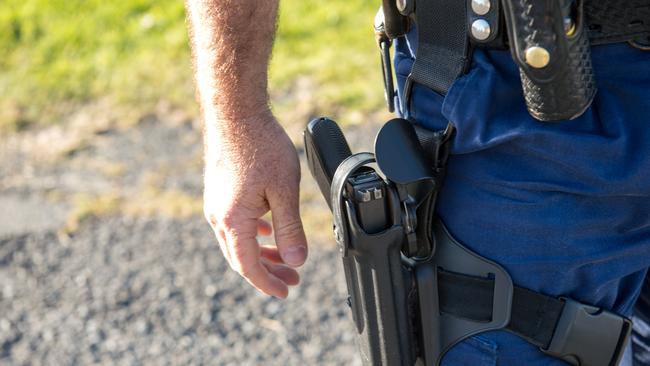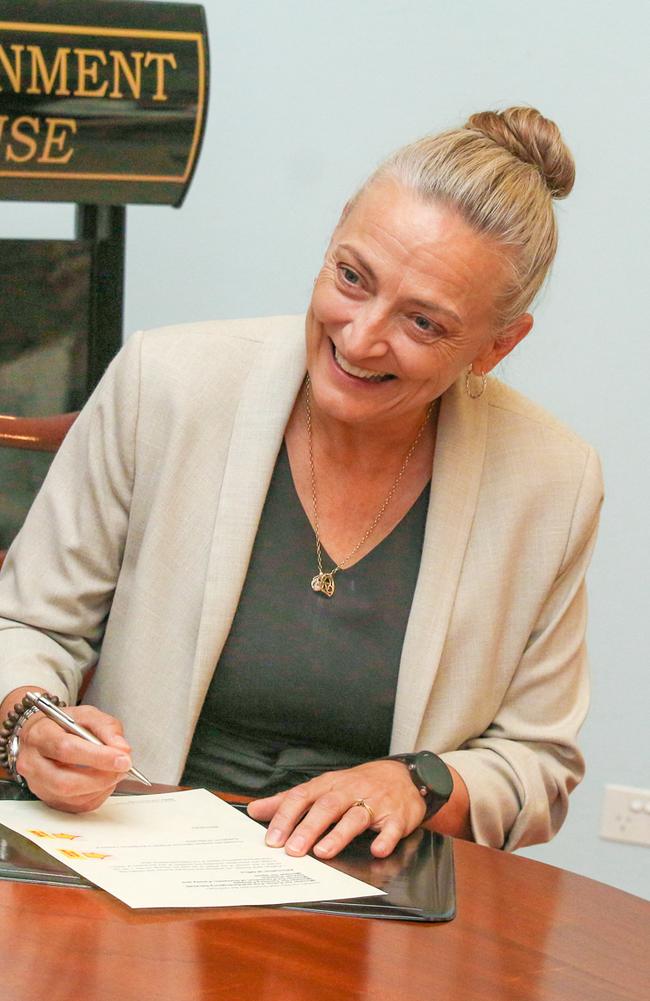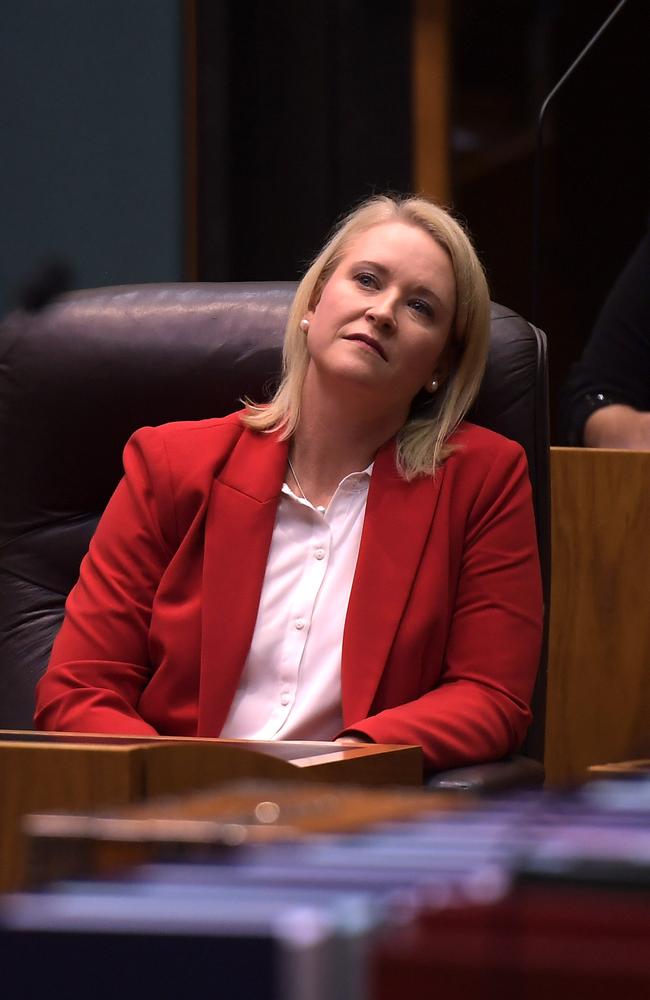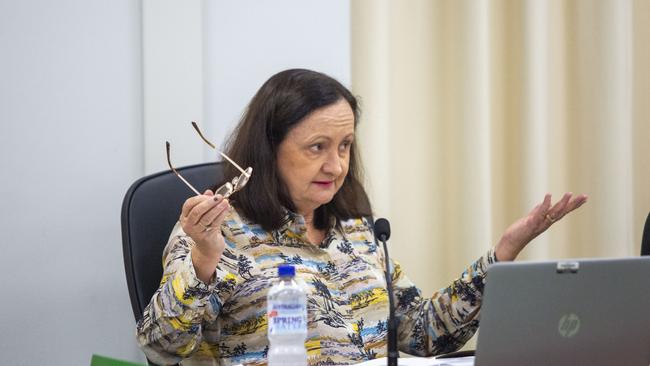NT government outlaws police disarmament, CLP makes bid against public drinking
Disarming a cop has now become an offence while the CLP is pushing to ban public drinking. Here’s how police powers and protection have changed.
News
Don't miss out on the headlines from News. Followed categories will be added to My News.
Deliberately disarming a police officer in the Territory will become an offence that could carry a prison sentence of six years.
The Fyles government passed amendments to an existing act during Thursday’s parliament sittings that Police Minster Kate Worden described as the “first of its kind in Australia”.
However, the opposition’s bid to beef-up the legislation was not accepted by the Labor majority.
The amendments created a new offence of disarming a police officer of their firearm or taser, something that Ms Worden said was not “sufficiently covered” in existing laws.
“It is our job to protect our police members so they can serve and protect our community,” she said.

“This new offence reflects the objective seriousness of such conduct, the importance of deterrents and the important role played by our police members every day.”
Ms Worden said “intent” of disarmament would have to be proved but the CLP fought for this to be scrapped.
“(Our proposed amendment) changes the wording from ‘possession’ to ‘control’, which is a lower bar to achieve prosecution,” Opposition Leader Lia Finocchiaro said.
“(It) expands the law so that if an offender stops a police officer from being able to use their weapon – for instance, by placing their hand over the weapon – then that will be an offence, irrespective of whether the offender intends to stop the cop from being able to access it.”
The opposition’s amendments, while supported by independent independent MLAs Robyn Lambley and Kezia Purick, were voted down by the Labor bloc.

The first parliament sittings of the year also had the CLP move to outlaw public drinking within 2km of a licenced premises.
“We need to provide our police with the ability, when they encounter such a person, to do more than just tip out their alcohol and help them take steps to change their behaviour,” opposition alcohol policy spokesman Gerard Maley said.
“This Bill would reverse the decision made in 2019 to turn a blind eye to public drunkenness.”
The legislation is expected to be debated in the March parliament sittings.
‘Power to act’: How bolstered trespass laws will protect workers
Stronger trespass laws have moved forward in parliament amid calls from those bearing the brunt of the crime crisis.
Police Minister Kate Worden introduced reforms in Wednesday’s parliament sittings that would make it easier to issue trespass notices and grant police more powers against trespassers.
It comes after the unions representing both businesses and shop employees advocated for the changes, not least since Alice Springs issues drew national attention.
The new laws, expected to pass in the March sittings, will allow a business owner or landlord to delegate police, security and other employees the power to issue a trespass warning.
Police will also be able to arrest anyone who breaches a direction to leave or issue a warning to stay off any given property.
Penalties will include a possible prison term of up to six months or fines up to 20 penalty units – currently $3240.

Shop, Distributive and Allied Employees Association (SDA) NT director Shlok Sharma‘s organisation had pushed for the reforms.
He said he welcomed the changes “on the face of it”.
“Currently, it’s incredibly difficult for shop owners to protect workers by banning violent and abusive customers,” he said.
“The legislation does seem to make it easier for police to enforce our trespass notices and gives them the power to act quicker.
“It also clears up some of the ambiguity around who can issue those trespass notices.
“For example a store owner will be able to delegate authority to security or another employee.
“We are encouraged by the fact the government is taking this issue seriously.”
Mr Sharma said 85 per cent of his surveyed members reported an increase in abuse towards them throughout last year.

Ms Worden said the reforms would clarify the penalties of trespassing.
“Police have also found their effectiveness to respond to trespass complaints frustrated by the requirement in the current Act to provide multiple warnings before being able to arrest or to remove a person for trespass,” she said.
“This new law will make the process of issuing and enforcing trespass orders more streamlined.”
Huge blow for Lambley’s booze-free parliament bid
Politicians and bureaucrats will still have a tipple at their fingertips in parliament after a move to ban booze was shut down.
Alice Springs-based Araluen MLA Robyn Lambley put her case forward in Wednesday’s parliament sittings, describing the motion as “leading by example”.
However, it was quickly opposed by Labor’s Tourism and Hospitality Minister Nicole Manison.
“When I look at the members of the Chamber, I see people who take their responsibilities very seriously,” Ms Manison said.
“This is a place of work where Territorians can feel assured that people come here every day, work hard, do their best for Territorians.

“I assure you that people do not just knock off and have a beer in the middle of the day or have a few drinks and walk into this Chamber.
“We have much important debate (sic) … we will not support the motion”
Ms Lambley said it would be a “symbolic gesture” that would only apply to workplaces of parliamentary members and their staff.
Public function spaces were not to be included in the ban.
“This is not about anyone being accused of drinking copious amounts of alcohol and taking advantage of the privilege that we have,” Ms Lambley said.
“It is a symbolic gesture that says to Territorians, ‘We are with you. We know how hard it is out there. We truly understand the impact of alcohol on every one of you’.

“Alcohol is at the core of many, if not all, of our social problems in the Northern Territory.
“In fact, I heard the Chief Minister mention earlier in question time that alcohol-related harm costs the Northern Territory about $2bn per year.
“It is an enormous problem which affects us all, directly and indirectly.”
The assembly then divided with Labor voting as a bloc against the Lambley, independent Mulka MLA Yingiya (Mark) Guyala and the seven CLP members.
It comes as the Fyles government passed urgent legislation on Tuesday night to reinstate grog bans in Aboriginal town camps and communities across the NT.
That legislation was gazetted on Thursday and is expected to be enforced by the week’s end.
More Coverage
Originally published as NT government outlaws police disarmament, CLP makes bid against public drinking




